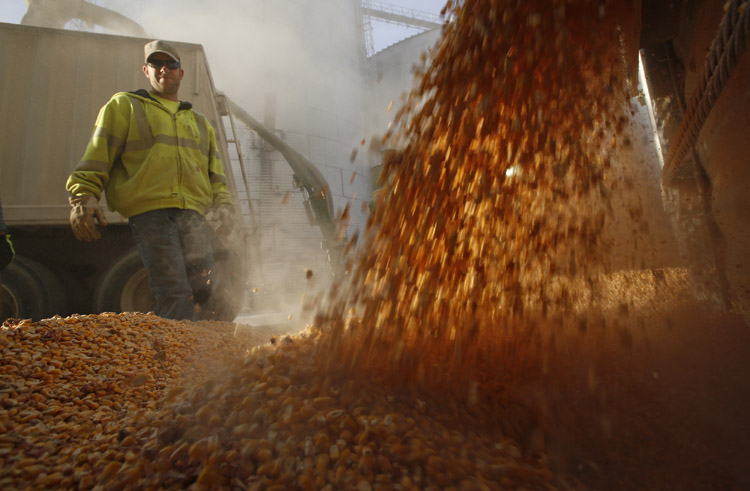Falling corn and wheat prices will mean some relief for Canadians at the grocery store this summer. Particularly when they’re buying meat, an expert predicts.

Globally, corn prices have fallen 15 per cent over the last 12 months, while wheat has fallen 18 per cent and oats have fallen 28 per cent.
“The good news for Canadians is that you may see meat prices be more under control,” says Dalhousie University professor Sylvain Charlebois. “Feeding animals is not going to cost more. We don’t expect that cost to increase any time soon.”
“For farmers, it’s not great news. If you’re a productive farmer, and you haven’t been affected by drought, you’re going to be selling your commodities at a lesser price.”
READ MORE: Beef prices start falling, will fall further, expert predicts
Prices of grain crops are softening for three reasons, he explains:
Falling meat consumption
We’re eating less meat, particularly red meat, and that affects commodity prices, Charlebois says:
“When people eat less meat, you actually need less fibre. You need less grain, particularly in the case of soy, corn, maize, canola.”
“You’re seeing consumers concerned about livestock production in general, and they’re opting for other protein sources. “
At the same time, meat consumption in the developing world, often seen as a potential export market for Canadian meat producers, isn’t rising.
“What is really interesting, and unanticipated, to be honest, is how demand for meat in developing countries is softening. We were expecting years and years of growth.”
Strong harvests
Corn and grain harvests this year in the United States and Canada are expected to be very large.
“The weather is co-operating across the world,” Charlebois explains.
“There’s enough moisture, and drought situations are much more under control this year. You’re looking at strong harvests … around the world, including Canada. There are probably going to be some excess inventories out there.”
WATCH: At this time last year, Alberta farmers were desperate for rain. Drought wreaked havoc on crops and cattle but in 2016, all the moisture has been good for growers. Kendra Slugoski reports.

Big-box retailers
Major retailers like Walmart are moving into the grocery business, and in the process are playing hardball with suppliers on price. That forces other grocers to move aggressively on price as well.
READ MORE: Grocery giant Loblaw demands suppliers cut prices to lower grocery bills
“In distribution things are really shifting,” Charlebois reflects.
WATCH: You may not have noticed yet, but the consumer price index shows that the cost of buying food in Canada is actually down. As Sean O’Shea reports, meat is among the commodities most affected. And you can chalk up some of the savings to what’s known as the Walmart effect.

However, Charlebois cautions, farmers are always responding to market signals, and soon enough falling prices will lead to falling production of lower-priced crops.
“You’re likely to see fewer farmers growing oats next year, but at the same time that may increase the price, because there will be less supply.”


Comments